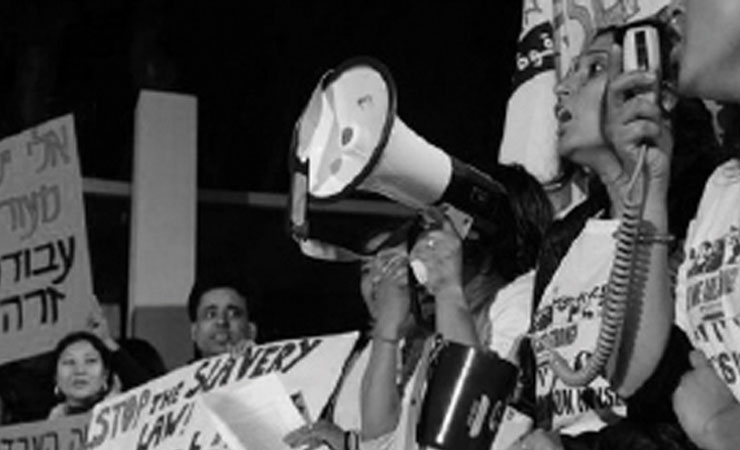Written by Salwa Alenat
As the state of the economy deteriorates and unemployment rates soar in the Palestinian Authority, more and more Palestinian women are forced to find employment in settlements and in Israeli industrial areas in the West Bank.
The workers come from difficult socio-economic backgrounds, most of them not having completed their high school studies, making their chances of finding a job in the Palestinian Authority slim. In the past, their families used to work their lands, but with expropriation of lands by the state of Israel and building of settlements, they have lost the option of working in the village fields and therefore must find employment at nearby settlements cleaning houses, working in sewing workshops and in food factories. In addition, they work for Israeli employers in moshavim in the Jordan Rift Valley. These are hundreds of Palestinian women employed in settlements, whose numbers are expected to continue rising.
Last Saturday, a group of women who work at a food factory in Mishor Adumim industrial area gathered. The five of them have been working in the factory for 8-15 years each. They have been there since the factory was built, working from the early morning hours to 17:00, earning barely 100 NIS per day. Male workers, who started working after them, are paid 65-120 NIS per day. The factory violates the Minimum Wage Law in regards to all of its workers. Most workers come from the Jericho area; a friend brings a friend. S., the most senior of the workers says, “Women in the neighborhood came to me and told me about their financial distress and their need for a job. When I had the chance to, I recommended one and she was hired.”
The women only heard of social rights such as vacation days, sick leave, holidays, overtime and severance pay in the Kav LaOved workshops they attended, led by a Kav LaOved representative in the Jericho Palestinian Trade Union office.
They were surprised to discover that they are entitled to the same pay as Israeli workers. S. can’t help but respond to that: “It’s hard to work for a place where you have been deceived for many years, and your distress has been exploited without pangs of conscience.”
According to the 2005 National Insurance regulations, Palestinian workers are entitled to National Insurance severance pay in case of an employer’s bankruptcy or work accident. Palestinian workers, unlike migrant workers, are not entitled to birth grants, under the claim they do not live in the settlements they work in. Pregnant women have to stop working since the working conditions don’t allow them to continue. D., a mother of two from the Ramallah area who worked at a sewing workshop in Mishor Adumim industrial area, left her job because she was not able to spend all of her work day sitting down, as her employer demanded. She said, “I was required to sit and bend over and it caused me great pains. I suffered a lot, until I felt like I was going to lose my baby and I took a break from work. After the birth, the employer didn’t want me back.”
Throughout the years the workers thought they were not entitled to benefits simply because they are women. Fear stopped them from finding out what their rights are. Now, as they are getting over their fear, they want their rights in full. In Al-Diok village next to Salfit, sewing workers in the Barkan industrial area lead a group lawsuit in the Tel Aviv Labor Court to get their lawful rights. The workers, who were paid between 6-8 NIS per work hour during a four year period, could not keep silent. M. tells us: “People in the village laughed at us. They told us we wouldn’t be able to face the Jewish employer and the Palestinian contractor because they were too strong. Many wanted to fail us. There was pressure from inside the workshop as well, shouting and constant threats. But we stood our ground, we filed the lawsuit in April 2008 and we continue to work today.”
They have no other choice but to keep working. They know they have to hang on to their jobs. R. says, “We have no other option; we provide for our families, the men are unemployed because they don’t have work permits. Many men work illegally in Israel and are therefore risking their lives.” These women carefully reviewed their steps. When they decided to organize and claim their rights, they acted with initiative.


